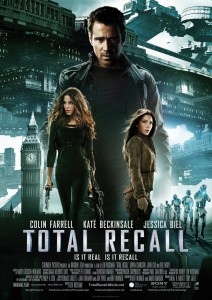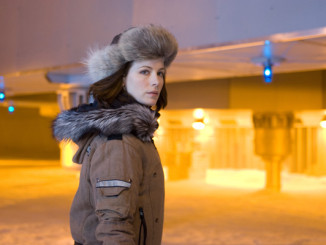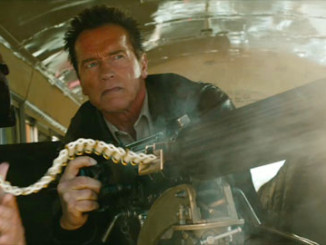 The Total Recall films ask the audiences to suspend a lot of their disbelief. After all, the films are built on the concept that in the future you will be able to chemically alter the human brain to install new memories and personalities. That’s a lot of disbelief to suspend.
The Total Recall films ask the audiences to suspend a lot of their disbelief. After all, the films are built on the concept that in the future you will be able to chemically alter the human brain to install new memories and personalities. That’s a lot of disbelief to suspend.
This remake figures that since you are suspending disbelief, why not ask you to suspend more. It asks you to believe that the world’s surviving population (there has been a nasty World War. Lots of chemical warfare) now lives only in Europe (or maybe just England. Possibly only London. The movie can’t seem to decide) and Australia. It asks you to believe that the typical work day commute between the two (through the center of the Earth, no less) would only take just a little bit over 15 minutes (whenever I travel the 20 miles into New York City, it takes 40 minutes, and that doesn’t even involve going through the Earth’s core. Then again, more stops.). And it asks you to believe that 56-year-old Bryan Cranston, he who can convincingly play a cancer-stricken meth dealer, can beat the snot out of 36-year-old Colin Farrell, he who has abs that you could realistically open beer bottles with.
However, if you are able to overlook these incredible and unrealistic plot points, and a few others, you might find a pretty good movie.
 Farrell plays Douglas Quaid, an assembly-line worker at a robotics plant who, like most of the rest of the working class in the world, lives in Australia (The Colony) and commutes to London (United Federation of Britain), the last two inhabitable societies left after years of devastating chemical warfare. He is in a dead-end job with crappy pay, albeit with an incredibly hot wife (Kate Beckinsale), who dreams of something more. What he usually dreams of, actually, is a life as a revolutionary, fighting for The Colony’s freedom beside Melina (Jessica Biel), a fellow revolutionary with benefits.
Farrell plays Douglas Quaid, an assembly-line worker at a robotics plant who, like most of the rest of the working class in the world, lives in Australia (The Colony) and commutes to London (United Federation of Britain), the last two inhabitable societies left after years of devastating chemical warfare. He is in a dead-end job with crappy pay, albeit with an incredibly hot wife (Kate Beckinsale), who dreams of something more. What he usually dreams of, actually, is a life as a revolutionary, fighting for The Colony’s freedom beside Melina (Jessica Biel), a fellow revolutionary with benefits.
One trip to Rekall, a shady company that offers memory implants, to seek a release from his hum drum reality turns that particular dream into a reality for Quaid. He becomes a real revolutionary, going on the run from his “wife,” who was only a government employee assigned to keep an eye on him yet now wants to kill him. He reunites with Melina, who wants to keep him safe from harm. Along the way, he uncovers a shadowy conspiracy involving the UFB’s Chancellor Vilos Cohaagen (Cranston) that could endanger millions of lives.
 As you can tell, the remake veers off in a different direction than the original. No, no travels to Mars in this one, although, in one of many “Easter Egg” style nods to the first film, Quaid does mention the idea to a co-worker. But while the story is different than the 1990 version, a lot of the plot points and story beats remain. This does lend an air of predictability, but usually there are subtle changes to make this film seem fresh. And Len Wiseman directs the action in such a way that the film moves along at a brisk pace.
As you can tell, the remake veers off in a different direction than the original. No, no travels to Mars in this one, although, in one of many “Easter Egg” style nods to the first film, Quaid does mention the idea to a co-worker. But while the story is different than the 1990 version, a lot of the plot points and story beats remain. This does lend an air of predictability, but usually there are subtle changes to make this film seem fresh. And Len Wiseman directs the action in such a way that the film moves along at a brisk pace.
The biggest star of the film is the production design. They have created a stacked world with tier after tier of structures on top of one another. Apartments are created out of whatever space is available. And instead of a three-lane highway, we get a three-level highway. This is a somewhat believable future (outside, of course, of the tunnel through the Earth). The technology is a blend of what we have now and what might logically come along in the next few decades. Furniture and buildings feature design elements that mix the new with the classic, much like the world we see outside our windows today mixes the past with the present. For the most part, this creates an believable experience.
 Overall, the acting is great. Farrell plays Quaid as a man outside of his element, trying to react as best he can to his constantly updating status quo. Biel does well as the earnest love interest/revolutionary. But the best performance comes from Kate Beckinsale. Beckinsale’s character in this film essentially is a blend of Sharon Stone’s and Michael Ironside’s from the first film. She play’s Lori with the determination of a bulldog and the personality of a alligator with a toothache. Watch her in the scene when Harry confronts Quaid in Quaid’s apartment building. It’s hard to figure out if her character is presenting genuine wifely concern of if she badly faking wifely concern. And, for this movie, that is the right note to play that character at that time.
Overall, the acting is great. Farrell plays Quaid as a man outside of his element, trying to react as best he can to his constantly updating status quo. Biel does well as the earnest love interest/revolutionary. But the best performance comes from Kate Beckinsale. Beckinsale’s character in this film essentially is a blend of Sharon Stone’s and Michael Ironside’s from the first film. She play’s Lori with the determination of a bulldog and the personality of a alligator with a toothache. Watch her in the scene when Harry confronts Quaid in Quaid’s apartment building. It’s hard to figure out if her character is presenting genuine wifely concern of if she badly faking wifely concern. And, for this movie, that is the right note to play that character at that time.
If there’s a weak link in the actors, it’s Bryan Cranston. Granted, he isn’t given much of a character to work with. For most of the movie, he appears sporadically, and then only to snarl orders at Lori via a video screen or give a false-earnest address to his subjects on TV. But when does become a bigger part of the story, he plays Cohaagen with a hammy, mustache-twirling villainy to overcompensate. His performance is out of sync with the uber-serious tone the film is trying to create. and takes you out of the narrative.
 That is, of course, of the plot holes don’t take out before Cranston arrives. In addition to what’s listed above, there are issues where the inhabitable zones begin and end (a map at the beginning of the film seems to show that the UFB is able to live in all of England and most of mainland Europe, yet a non-inhabitable zone is only a subway ride away), why Lori defies orders to keep Quaid alive and tries to kill him (Does she consider him too big of a threat? Professional jealousy? He leave the toilet seat up too many times?), and why a majority of the people in London and Australia speak with American accents when it has been established that the tunnel through the Earth had to be constructed because that is the only way people are able to travel.
That is, of course, of the plot holes don’t take out before Cranston arrives. In addition to what’s listed above, there are issues where the inhabitable zones begin and end (a map at the beginning of the film seems to show that the UFB is able to live in all of England and most of mainland Europe, yet a non-inhabitable zone is only a subway ride away), why Lori defies orders to keep Quaid alive and tries to kill him (Does she consider him too big of a threat? Professional jealousy? He leave the toilet seat up too many times?), and why a majority of the people in London and Australia speak with American accents when it has been established that the tunnel through the Earth had to be constructed because that is the only way people are able to travel.
So, your enjoyment of this film will depend on what kind of moviegoer you are. If you are the kind of person who analyzes the film they just saw, you’ll probably hate it. If you are the type who can overlook plot gaps if the action is good, then you might like it. If you fall somewhere in between, well, you’ll probably be frustrated.





